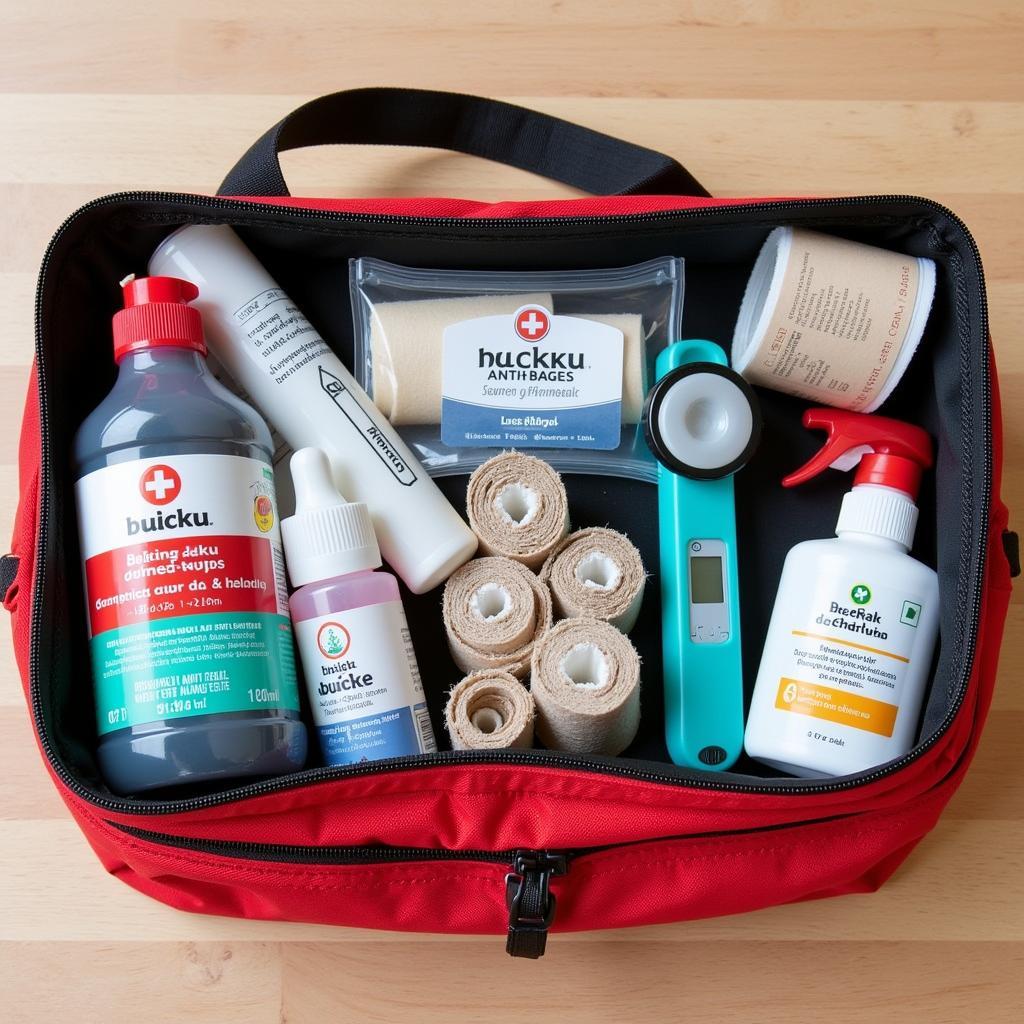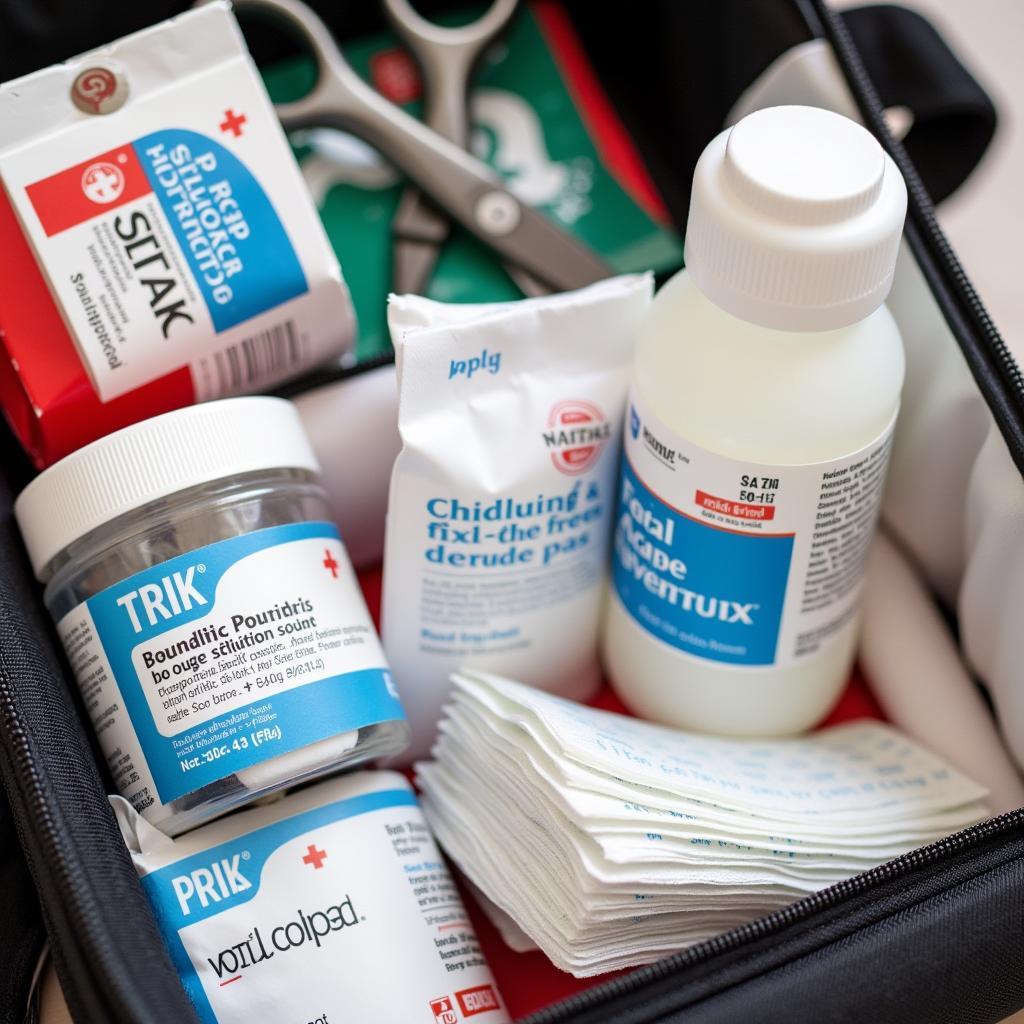As a horse owner, you understand the importance of being prepared for anything. While we all hope for the best, it’s crucial to be ready for the unexpected, especially when it comes to our equine companions. A well-stocked horse first aid kit can make all the difference in an emergency situation, allowing you to provide immediate care and potentially minimize further injury while waiting for the veterinarian.
 Horse first aid kit essentials
Horse first aid kit essentials
Building Your Horse First Aid Kit: A Comprehensive Guide
Creating a comprehensive horse first aid kit doesn’t have to be complicated. Here’s a step-by-step guide to help you gather all the necessary items:
1. The Right Container:
Choosing the right container for your horse first aid kit is crucial for organization and accessibility. A sturdy plastic toolbox or a large, waterproof duffel bag are both excellent options. Ensure it’s spacious enough to accommodate all your supplies and easy to carry.
2. Essential Supplies:
Your horse first aid kit should include a variety of items to address common equine injuries and ailments. These are the essentials:
- Wound Care:
- Antiseptic solution (Povidone-iodine or chlorhexidine)
- Sterile gauze pads (various sizes)
- Non-stick pads
- Cotton wool
- Vet wrap (self-adhesive bandage)
- Elastikon (adhesive tape)
- Scissors (blunt-tipped for safety)
- Tweezers
- Irrigation syringe
- Wound ointment or cream
- Medications (Consult your veterinarian before administering any medications):
- Non-steroidal anti-inflammatory drugs (NSAIDs) like Bute (phenylbutazone)
- Banamine (flunixin meglumine) – Always consult your vet before administering any medication to your horse.
- Other Essentials:
- Thermometer (digital rectal thermometer)
- Stethoscope
- Lubricant (KY Jelly or similar)
- Latex gloves (non-latex options available)
- Flashlight and extra batteries
- Duct tape (for securing bandages and other uses)
- Pen and notepad (for recording vital signs and observations)
- Emergency contact list (veterinarian, farrier, experienced horse owner)
 Equine wound care supplies
Equine wound care supplies
Understanding Common Horse Injuries & First Aid
Being familiar with common horse injuries and their basic first aid is essential for any horse owner.
1. Lacerations (Cuts):
Lacerations are common horse injuries and require prompt attention. Here’s how to provide first aid:
- Control Bleeding: Apply direct pressure to the wound using a clean gauze pad.
- Clean the Wound: Once bleeding is controlled, gently clean the wound with an antiseptic solution.
- Bandage the Wound: Apply a non-stick pad and secure it with vet wrap. Ensure the bandage is snug but not too tight.
2. Puncture Wounds:
Puncture wounds can be deceptive and require immediate veterinary attention. Here’s what to do:
- Assess the Wound: Determine the depth and severity of the puncture.
- Clean the Area: Gently clean the area around the wound with antiseptic.
- Call Your Veterinarian: Puncture wounds often require antibiotics and tetanus boosters.
3. Colic:
Colic, a term for abdominal pain, is a serious condition in horses. Recognizing the signs and acting quickly is crucial.
Signs of Colic:
- Restlessness
- Pawing
- Looking at their flank
- Rolling
- Lack of appetite
First Aid for Colic:
- Remove food and water.
- Keep the horse calm and walking if possible.
- Contact your veterinarian immediately.
Essential Tips for Equine Emergency Preparedness
Beyond having a well-stocked horse first aid kit, here are some additional tips to ensure you’re prepared for equine emergencies:
- Regularly Check Your Kit: Inspect your horse first aid kit every few months to replenish any depleted items and check expiration dates.
- Schedule Vet Checkups: Maintain regular veterinary checkups for your horse to detect any potential health issues early on.
- Know Your Horse’s Vitals: Familiarize yourself with your horse’s normal temperature, pulse, and respiration rates.
- Educate Yourself: Take time to learn about common horse ailments and injuries. There are plenty of resources available online and through equine organizations.
Remember, providing immediate first aid can be crucial in equine emergencies, but it’s always essential to contact your veterinarian as soon as possible for professional guidance and treatment.
Do you have any unique gift ideas for the horse lover in your life? Check out these gift ideas for horse owners.
Frequently Asked Questions About Horse First Aid
1. What is the best antiseptic for horse wounds?
Povidone-iodine (Betadine) and chlorhexidine are both effective antiseptics for cleaning horse wounds.
2. Should I use hydrogen peroxide on my horse’s wound?
Hydrogen peroxide is not recommended for horse wounds as it can damage healthy tissue and delay healing.
3. How can I tell if my horse has a fever?
A horse’s normal temperature ranges from 99.5°F to 101.5°F. Use a digital rectal thermometer to check your horse’s temperature.
4. What should I do if my horse is lame?
If your horse is lame, confine them to a stall or small paddock and contact your veterinarian to assess the situation.
5. Can I give my horse human pain relievers?
Never give your horse human medications without consulting your veterinarian. Some human medications can be toxic to horses.
6. How often should I check my horse’s first aid kit?
It’s a good practice to inspect and replenish your horse’s first aid kit every few months.
7. What is the most important thing to remember in a horse emergency?
Stay calm, assess the situation, and contact your veterinarian immediately.
For more tips on creating a fun and engaging environment for your horses, explore these horse camp games.
Need More Help?
Have other questions about your horse’s health or need help choosing the right first aid supplies? Don’t hesitate to reach out to us! At Justus Horses USA, we’re committed to providing horse owners with the knowledge and resources they need to keep their beloved companions happy and healthy.
Contact Justus Horses USA:
- Phone: 0772127271
- Email: [email protected]
- Address: QGM2+WX2, Vị Trung, Vị Thuỷ, Hậu Giang, Việt Nam
Our dedicated customer support team is available 24/7 to assist you.